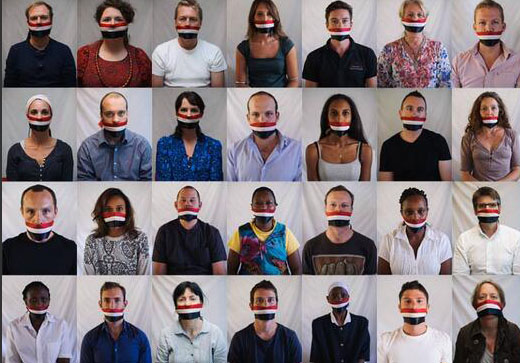The ICJ deplores the wave of recent decisions by Egyptian officials and courts that aim to silence journalists, human rights defenders, political activists and all those suspected of opposing the military and the government.
On June 23, the Criminal Court of Cairo convicted three journalists from Al Jazeera and sentenced them to between seven and 10 years imprisonment for charges that included “falsifying news” and “supporting and belonging to a terrorist organization”.
During each of the trial hearings, the prosecution failed to present any credible evidence to support these accusations.
On June 11, under Law no. 107 of 2013 on public meetings, processions and protests, the South Cairo Criminal Court convicted 25 individuals and sentenced them to 15 years imprisonment for participating in a demonstration in front of the Shura Council.
The Minya Criminal Court convicted and sentenced to death 529 individuals on March 24 and a further 683 individuals on April 28 for charges that included “killing a police officer”, attacking the “Adawa police station”, “destroying public property” and “seizing weapons”.
On June 21, at a protest calling for the revocation of Law no. 107 of 2013 and the release of all those arrested under it, 23 human rights activists were arrested.
They are being investigated by prosecutors for accusations that include, “obstructing the application of the law”; “participating in an unauthorized demonstration”; “damaging public property”; and “demonstrating force with a view to terrorizing citizens”.
Law no. 107 not only places overly restrictive limitations on the exercise of the right to freedom of assembly, it also gives security forces sweeping powers to disperse protests and to continue what has been a sustained and violent crackdown on protesters over the last year.
“Egypt’s military and government are using the judiciary and the Office of the Public Prosecutor to crush the exercise of freedom of expression and assembly, criminalize the practice of journalism and to spread fear and intimidation among all those suspected of peaceful opposition activity”, said Said Benarbia, Director of the ICJ’s MENA programme. “Many judges and prosecutors are now abdicating their primary responsibility to uphold the rule of law. Instead, they are serving as instruments of its demise in Egypt.”
The ICJ is deeply concerned that the crackdown on those suspected of opposing the military and the government has extended to the judiciary itself, including the dismissal and criminal prosecution of judges.
On 24 July 2013, 75 Egyptian judges signed a statement protesting against the removal of President Morsi, the suspension of the Constitution, the dissolution of the Shura Council and the closure of media outlets without a judicial order.
All 75 were referred to a disciplinary board for both disciplinary charges under the Judicial Authority Law and criminal charges under the Penal Code. Many of them have been subjected to official travel bans.
Other judges have been accused of forming an illegal group, “Judges for Egypt”, which called for the return of the ousted President Morsi.
They were referred to a disciplinary board for charges that include “stirring sedition among the ranks of judges” and “threatening public security”.
Under international standards, judges, like other citizens, have the right to freedom of association, assembly and expression, including by commenting on matters of public concern and matters pertaining to the rule of law and human rights situation in a country.
“Egypt’s military and civilian authorities have been subjecting judges who have done no more than peacefully express their views on the military’s unlawful seizure of power in Egypt to disciplinary and criminal proceedings. The authorities must immediately stop interfering with the judiciary and judicial process and move the country back toward respect for the rule of law,” Benarbia concluded.
Contact:
Said Benarbia, ICJ Director of the ICJ Middle East and North Africa Programme, tel: 41 22 979 38 1, e-mail: said.benarbia(a)icj.org





